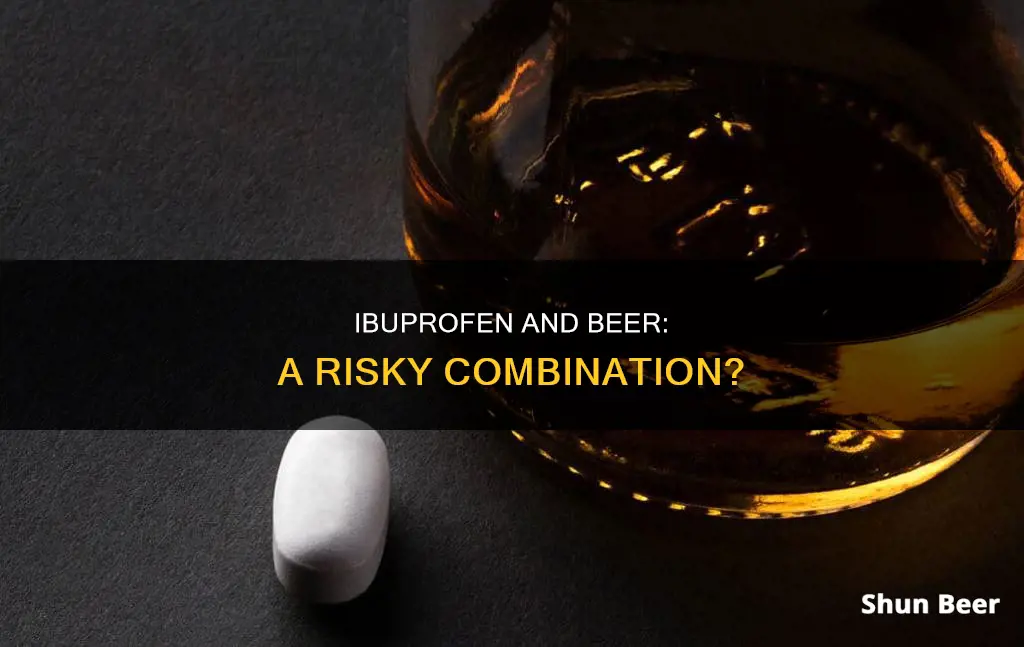
Drinking beer while taking ibuprofen is generally not recommended. While consuming a small amount of alcohol while taking ibuprofen is typically considered safe, regularly doing so can have adverse effects on your stomach, digestive tract, and kidneys. Both substances can irritate the stomach lining and digestive tract, and increase the risk of ulcers and gastrointestinal bleeding. Additionally, ibuprofen can affect kidney function, and when combined with alcohol, which can cause dehydration, the risk of kidney-related issues is further heightened. It is advisable to consult a doctor or medical professional for specific guidance regarding alcohol consumption while taking ibuprofen, as individual factors such as age, general health, and medical history can influence the level of risk.
| Characteristics | Values |
|---|---|
| Risk of gastrointestinal bleeding | Increased |
| Risk of kidney damage | Increased |
| Risk of liver damage | Increased |
| Risk of acute kidney injury | Increased |
| Risk of acute tubular necrosis | Increased |
| Risk of nephrosclerosis | Increased |
| Risk of drowsiness | Increased |
| Risk of lack of alertness | Increased |
| Risk of decreased medication effectiveness | Increased |
| Risk of increased medication side effects | Increased |
What You'll Learn

Gastrointestinal bleeding
Gastrointestinal (GI) bleeding is a serious condition that can be fatal. Both alcohol and ibuprofen irritate the stomach lining, and drinking and taking ibuprofen simultaneously increases the risk of GI bleeding.
Ibuprofen is a nonsteroidal anti-inflammatory drug (NSAID) that reduces pain and inflammation. It works by blocking an enzyme called cyclooxygenase (COX), which is involved in the body's inflammatory response, as well as supporting kidney function and maintaining the lining of the gastrointestinal tract. Regular or prolonged ibuprofen use can irritate the stomach lining, leading to ulcers and bleeding.
Alcohol is also a known irritant to the stomach lining, and drinking too much, too frequently, can cause gastritis (inflammation of the stomach lining), triggering the development of stomach ulcers and bleeding. When combined with ibuprofen, the risk of GI bleeding is further amplified.
A study of 1,224 participants showed that regular ibuprofen use increased the risk of stomach and intestinal bleeding in people who consumed alcohol. The risk of GI bleeding is influenced by the amount of alcohol consumed and the dosage of ibuprofen taken. Heavy drinking (more than 21 drinks per week) and regular ibuprofen use were found to have a relative risk of 2.8 for acute upper GI bleeding. Occasional ibuprofen use was not found to increase the risk of GI bleeding in people who drank alcohol.
The possible GI consequences of mixing alcohol and ibuprofen are especially concerning, as a GI bleed can become fatal. If you take ibuprofen and drink alcohol, be vigilant for symptoms of GI bleeding, including stomach pain or cramps that do not go away, vomit that resembles coffee grounds, black or tarry stools, and dizziness or fainting. If these symptoms appear, seek emergency medical attention.
Drinking Beer in Dubai: What's Allowed and What's Not
You may want to see also

Kidney damage
While drinking a small amount of alcohol while taking ibuprofen is generally considered safe, mixing the two substances can increase the risk of kidney damage.
Ibuprofen is a nonsteroidal anti-inflammatory drug (NSAID) that is used to relieve pain, swelling, and fever. It can be purchased over the counter under various brand names, such as Advil, Motrin, and Midol. While it is easily accessible, ibuprofen is still a strong medication that can cause harmful side effects, especially if not taken correctly.
Long-term use of ibuprofen can lead to kidney damage by inhibiting the production of prostaglandins, hormones that are necessary for normal urine output. This can result in acute kidney injury (AKI) or acute renal failure. The risk of ibuprofen-induced kidney injury is particularly high for people with pre-existing kidney disease and extreme athletes who are prone to kidney impairment due to rapid muscle breakdown.
Alcohol is also known to damage kidney function. Regular heavy drinking doubles the risk of developing chronic kidney disease. When ibuprofen and alcohol are consumed together, the risk and severity of kidney damage are significantly increased.
To reduce the risk of kidney damage, it is advisable to avoid drinking alcohol while taking ibuprofen. If you have underlying medical conditions or are taking other medications, it is important to consult your doctor before consuming alcohol with ibuprofen. Additionally, it is recommended to wait at least 10 hours after taking ibuprofen before drinking alcohol, as it takes about that long for ibuprofen to clear from your system.
Beer and Clonazepam: Safe Mix or Risky Business?
You may want to see also

Lack of alertness
Mixing ibuprofen and alcohol can lead to a lack of alertness, which can be dangerous. Both substances can cause drowsiness and impaired cognitive function, and when combined, they can lead to excessive sleepiness, slowed reaction times, and impaired coordination. This lack of alertness can increase the risk of accidents, such as falling asleep while driving, even if you have only consumed a small amount of alcohol. It is important to avoid driving or operating heavy machinery after taking ibuprofen and drinking alcohol.
The combination of ibuprofen and alcohol can also affect your judgment and decision-making abilities. You may feel more relaxed due to the effects of both substances, but this can lead to impaired judgment and an increased risk of unintentional harm to yourself or others. It is crucial to be aware of these risks and avoid activities that require alertness and coordination after mixing ibuprofen and alcohol.
Additionally, mixing ibuprofen and alcohol can cause other side effects, including gastrointestinal bleeding, kidney damage, and liver problems. These side effects can be severe and may require medical attention. It is important to be cautious and avoid mixing these substances whenever possible. If you experience any negative side effects, it is recommended to seek medical advice or assistance.
Beer and Blood Work: Can You Drink Before?
You may want to see also

Less effective medication
Mixing ibuprofen and alcohol can make the medication less effective while simultaneously worsening the side effects of both substances.
Ibuprofen is a nonsteroidal anti-inflammatory drug (NSAID) that blocks the enzyme cyclooxygenase (COX) to reduce inflammation and pain. Cyclooxygenase also supports kidney function, promotes blood platelet aggregation, and helps maintain the lining of the gastrointestinal (GI) tract. Regular or prolonged ibuprofen use can irritate the stomach lining, leading to ulcers, bleeding, kidney damage, and issues with blood clotting.
Alcohol is also a known irritant to the stomach lining and can cause gastritis, stomach ulcers, and bleeding. It can also damage the kidneys and thin the blood. When mixed with ibuprofen, these effects are amplified, increasing the risk of gastrointestinal bleeding, kidney damage, and lack of alertness.
The combination of ibuprofen and alcohol can also lead to increased drowsiness, impaired coordination, slowed reaction times, and slurred speech. This can result in an increased risk of accidents or unintentional harm to oneself or others.
Therefore, while a small amount of alcohol with ibuprofen is generally considered safe, it is recommended to avoid mixing the two whenever possible.
Masons and Beer: Drinking Culture in Fraternal Organizations
You may want to see also

Increased drowsiness
Mixing ibuprofen and alcohol can lead to increased drowsiness. Both substances can cause drowsiness on their own, but when combined, this effect may be amplified, resulting in excessive sleepiness or difficulty functioning normally. This lack of alertness can increase the risk of accidents, impaired coordination, slowed reaction times, and slurred speech. It is important to avoid activities that require concentration and coordination, such as driving, when mixing ibuprofen and alcohol.
The combination of ibuprofen and alcohol can also impact kidney function. Ibuprofen affects kidney function by inhibiting the production of the enzyme cyclooxygenase (COX), which is important for maintaining normal urine output. Alcohol, on the other hand, can damage the filters of the kidneys, called glomeruli, and increase the risk of nephrosclerosis, a condition where the structures of the kidneys scar, harden, and narrow. Together, ibuprofen and alcohol can significantly increase the risk and severity of kidney damage.
Additionally, mixing ibuprofen and alcohol can irritate the stomach and intestinal lining. Both substances can irritate the digestive tract, and when combined, they further increase the risk of ulcers and gastrointestinal bleeding. This risk is particularly high for individuals with a history of stomach ulcers, long-term NSAID use, or existing kidney damage. It is important to be cautious when mixing these substances and seek medical advice if any signs or symptoms of gastrointestinal bleeding occur, such as ongoing stomach pain, tarry stools, or blood in vomit.
While consuming a small amount of alcohol while taking ibuprofen is generally considered safe, it is important to be cautious and avoid mixing them whenever possible. The risks associated with this combination are particularly relevant for individuals with underlying medical conditions, such as liver or kidney disease, high blood pressure, or heart failure. It is always advisable to consult a healthcare professional to understand the potential risks based on individual health factors.
Uncapping the Secret: Beer Vending Machines Simplified
You may want to see also
Frequently asked questions
It is generally not recommended to mix ibuprofen and alcohol, as it can irritate the stomach and intestinal lining and increase the risk of gastrointestinal bleeding and kidney damage. Even a small amount of alcohol can be risky, and the more you drink, the higher the risks. It is best to avoid drinking alcohol while taking any pain relievers, including ibuprofen.
Mixing ibuprofen and alcohol can lead to serious side effects, including an increased risk of gastrointestinal bleeding, kidney damage, and liver problems. It can also cause drowsiness, dizziness, blurred vision, and impaired coordination, increasing the risk of accidents. Additionally, alcohol can make ibuprofen less effective while intensifying its side effects.
It is recommended to wait at least 10 hours after taking ibuprofen before consuming alcohol, as it takes about that long for ibuprofen to clear from your system. However, if you have been taking regular or high doses of ibuprofen, it is best to wait longer, as ibuprofen can stay in your system for up to 24 hours.







